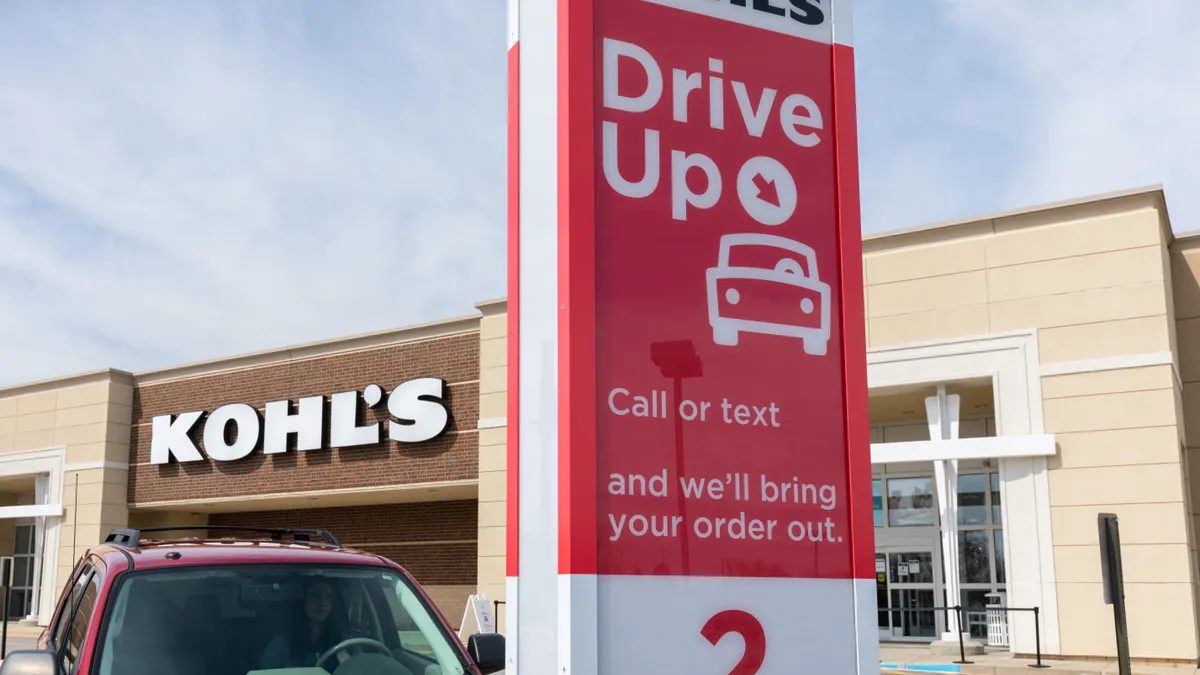Dive Brief:
-
Kohl's on Tuesday reported that second quarter total revenue dropped 23.1% year over year to $3.4 billion. Net sales fell 22.9% in the quarter to $3.2 billion, compared to a 3.3% decline in the same period last year. Digital sales grew 58%, according to a conference call presentation.
-
The department store said it isn't reporting store comps due to pandemic-related store closures. Gross margin in the period shrank by 569 basis points to 33.1% from 38.8% a year ago.
-
Net income tumbled 80% to $47 million, from $241 million a year ago. Inventory fell 26% in Q2 2020 to $2.7 billion from $3.7 billion in the year-ago quarter, according to a company press release.
Dive Insight:
Executives on a conference call with analysts recognized the ongoing pandemic crisis, but struck an upbeat note regarding Kohl's reaction to it. CEO Michelle Gass went so far as to say that Kohl's is poised to take market share in the COVID-19 era, despite its difficulties.
She noted that the retailer in the quarter ran its stores for 25% fewer days, with limited hours, compared to last year. May was the most challenging month, with a "strong rebound" in June, but in July surges in the outbreak in some areas caused sales to fall off again, she said. During the period, store productivity was at about 75% for opened stores, or "closer to 90%" if store-based fulfillment is accounted for, according to Gass.
The retailer, which had invested in website functionality improvements, moved quickly to enhance omnichannel services, launching "store drive-up" services April 2. "We are a well-disciplined operator," Gass said.
The company said it's continuing to work on tamping down the elevated shipping costs from increased digital orders and is focused on cutting down on multiple shipments on single orders.
Gass noted that stores are getting improvements like wider aisles and improved lighting. That could close the gap between stores and the online and omnichannel operations, according to Jane Hali & Associates, who noted in emailed comments that the retailer was among the first to offer curbside pickup and leverage stores as fulfillment centers. "The digital experience is much better than the in-store experience," Hali analysts said. "Product categories are much better merchandised online. The ... app is great and provides a seamless experience."
However, while Gass herself said that the company's digital operations are more important than ever in the COVID era, some aspects could use improvement. Per Hali research, the retailer's influencer/social media following is at about 1.5 million and hasn't grown since February. "The content could be more engaging," Hali analysts said.
The retailer was able to protect margins to some extent, with Hali research finding "moderate" promotional levels of 30% and under.
Gass repeated her previous contention that the company's Amazon returns program has driven traffic. In order to promote social distancing within stores, the Amazon operation has been moved to back of stores, she said.
Kohl's like many retailers is revamping its loyalty program, which Gass said boasts 30 million members. After what she called a pilot that yielded "positive results," Kohl's next month is launching the "new, more integrated rewards" program nationwide.
Executives noted again that they have overhauled their private labels, sweeping away poor selling brands and introducing new ones, to positive results. Hali analysts placed Kohl's private brands Tek Gear and Lauren Conrad as positives, but said that "overall women's business needs work and continues to be a weakness for the retailer."
In the quarter, the retailer had strength in beauty and home goods, and toy sales rose by double digits, CFO Jill Timm said. Kohl's announced it will expand its assortment of Champion items amid growing activewear sales, which Credit Suisse analyst Michael Binetti pegged as a positive. To the chagrin of some analysts, Target two years ago dropped its Champion assortment in favor of developing private activewear labels.
















